Islamic Intellectual History: Examining Reform and Renewal (18-20th)
VerifiedAdded on 2023/01/05
|7
|1428
|73
Essay
AI Summary
This essay delves into the intellectual history of Islam from the 18th to the 20th centuries, examining whether the period was characterized by reform or renewal. The analysis is grounded in the study of David Commins' "The Wahhabi Mission and Saudi Arabia," alongside primary sources like Muhammad b. 'Abd al-Wahhab's "Kitab al-Tawhid," and the works of Afghani and Sayyid Qutb. The essay explores the emergence of Wahhabism, its impact on Saudi Arabia, and its subsequent spread. It investigates the arguments surrounding the Wahhabi movement, its critics, and the broader context of Islamic revivalism. The discussion considers the influence of Wahhabism, its role in contemporary issues, and the perspectives of Muslim scholars and critics. Through this examination, the essay seeks to provide a nuanced understanding of the historical dynamics within Islam and the ongoing debates about reform and renewal. The essay also highlights the complexities of interpreting historical events and the importance of considering diverse viewpoints when analyzing religious and political developments.
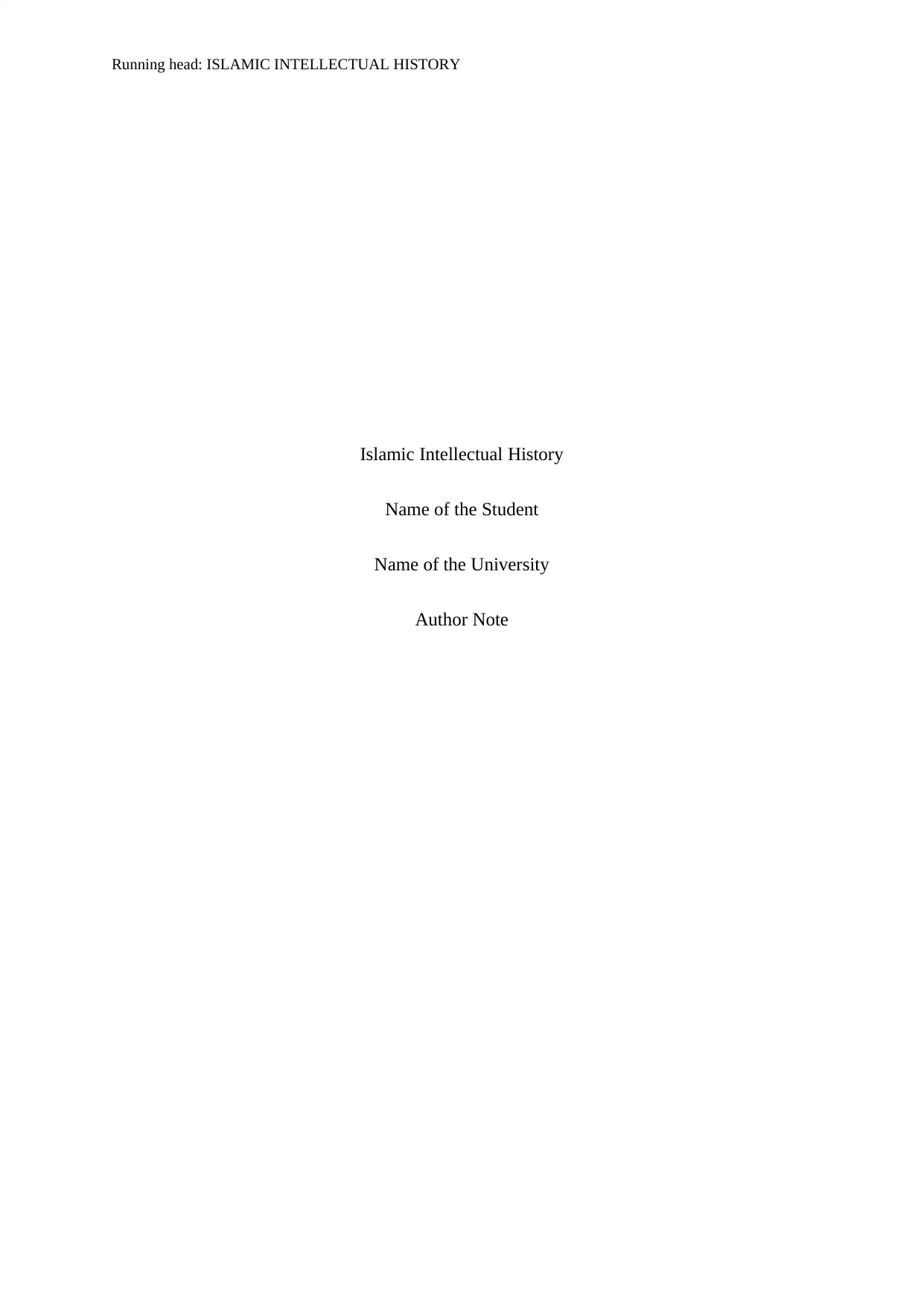
Running head: ISLAMIC INTELLECTUAL HISTORY
Islamic Intellectual History
Name of the Student
Name of the University
Author Note
Islamic Intellectual History
Name of the Student
Name of the University
Author Note
Paraphrase This Document
Need a fresh take? Get an instant paraphrase of this document with our AI Paraphraser
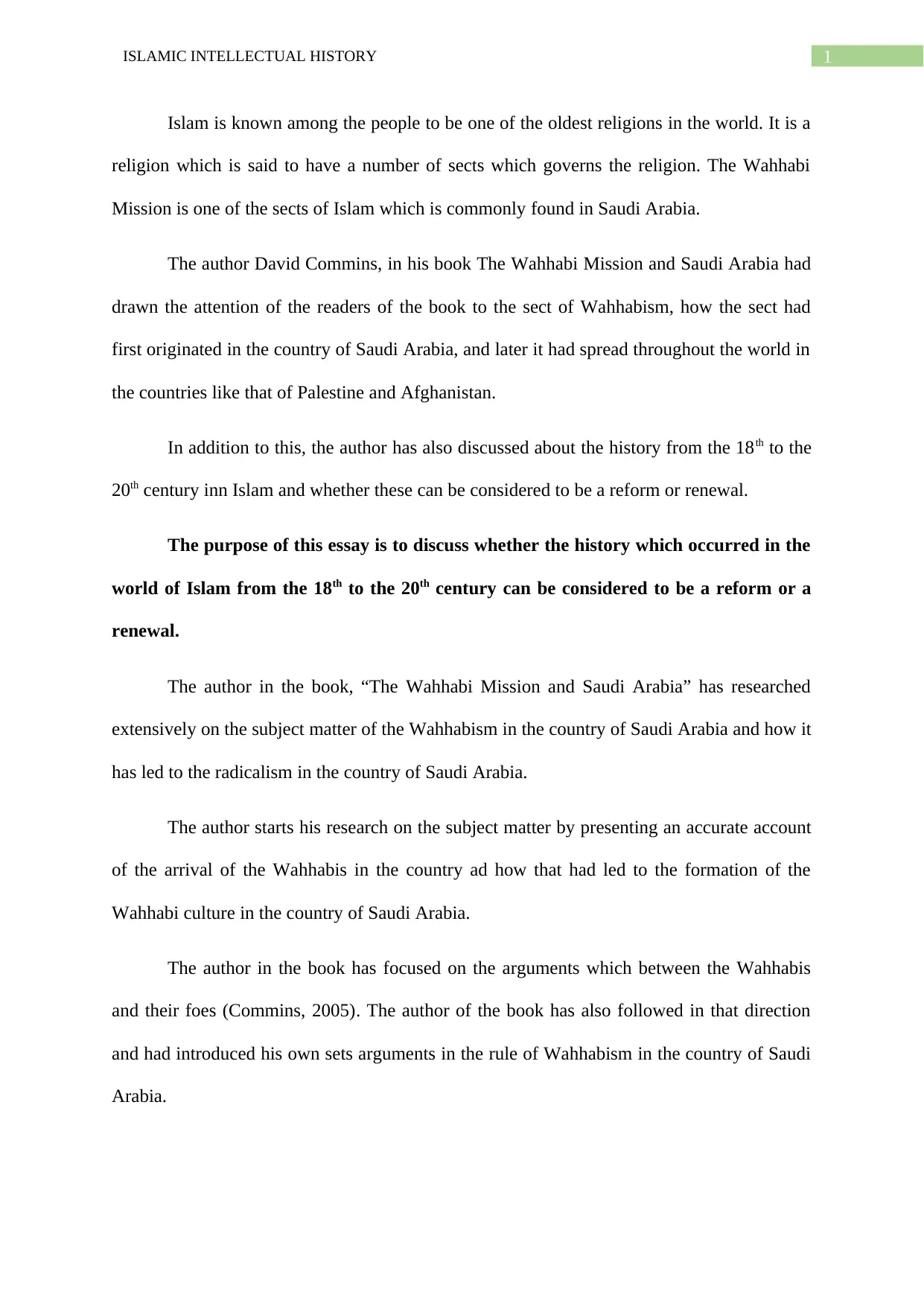
1ISLAMIC INTELLECTUAL HISTORY
Islam is known among the people to be one of the oldest religions in the world. It is a
religion which is said to have a number of sects which governs the religion. The Wahhabi
Mission is one of the sects of Islam which is commonly found in Saudi Arabia.
The author David Commins, in his book The Wahhabi Mission and Saudi Arabia had
drawn the attention of the readers of the book to the sect of Wahhabism, how the sect had
first originated in the country of Saudi Arabia, and later it had spread throughout the world in
the countries like that of Palestine and Afghanistan.
In addition to this, the author has also discussed about the history from the 18th to the
20th century inn Islam and whether these can be considered to be a reform or renewal.
The purpose of this essay is to discuss whether the history which occurred in the
world of Islam from the 18th to the 20th century can be considered to be a reform or a
renewal.
The author in the book, “The Wahhabi Mission and Saudi Arabia” has researched
extensively on the subject matter of the Wahhabism in the country of Saudi Arabia and how it
has led to the radicalism in the country of Saudi Arabia.
The author starts his research on the subject matter by presenting an accurate account
of the arrival of the Wahhabis in the country ad how that had led to the formation of the
Wahhabi culture in the country of Saudi Arabia.
The author in the book has focused on the arguments which between the Wahhabis
and their foes (Commins, 2005). The author of the book has also followed in that direction
and had introduced his own sets arguments in the rule of Wahhabism in the country of Saudi
Arabia.
Islam is known among the people to be one of the oldest religions in the world. It is a
religion which is said to have a number of sects which governs the religion. The Wahhabi
Mission is one of the sects of Islam which is commonly found in Saudi Arabia.
The author David Commins, in his book The Wahhabi Mission and Saudi Arabia had
drawn the attention of the readers of the book to the sect of Wahhabism, how the sect had
first originated in the country of Saudi Arabia, and later it had spread throughout the world in
the countries like that of Palestine and Afghanistan.
In addition to this, the author has also discussed about the history from the 18th to the
20th century inn Islam and whether these can be considered to be a reform or renewal.
The purpose of this essay is to discuss whether the history which occurred in the
world of Islam from the 18th to the 20th century can be considered to be a reform or a
renewal.
The author in the book, “The Wahhabi Mission and Saudi Arabia” has researched
extensively on the subject matter of the Wahhabism in the country of Saudi Arabia and how it
has led to the radicalism in the country of Saudi Arabia.
The author starts his research on the subject matter by presenting an accurate account
of the arrival of the Wahhabis in the country ad how that had led to the formation of the
Wahhabi culture in the country of Saudi Arabia.
The author in the book has focused on the arguments which between the Wahhabis
and their foes (Commins, 2005). The author of the book has also followed in that direction
and had introduced his own sets arguments in the rule of Wahhabism in the country of Saudi
Arabia.
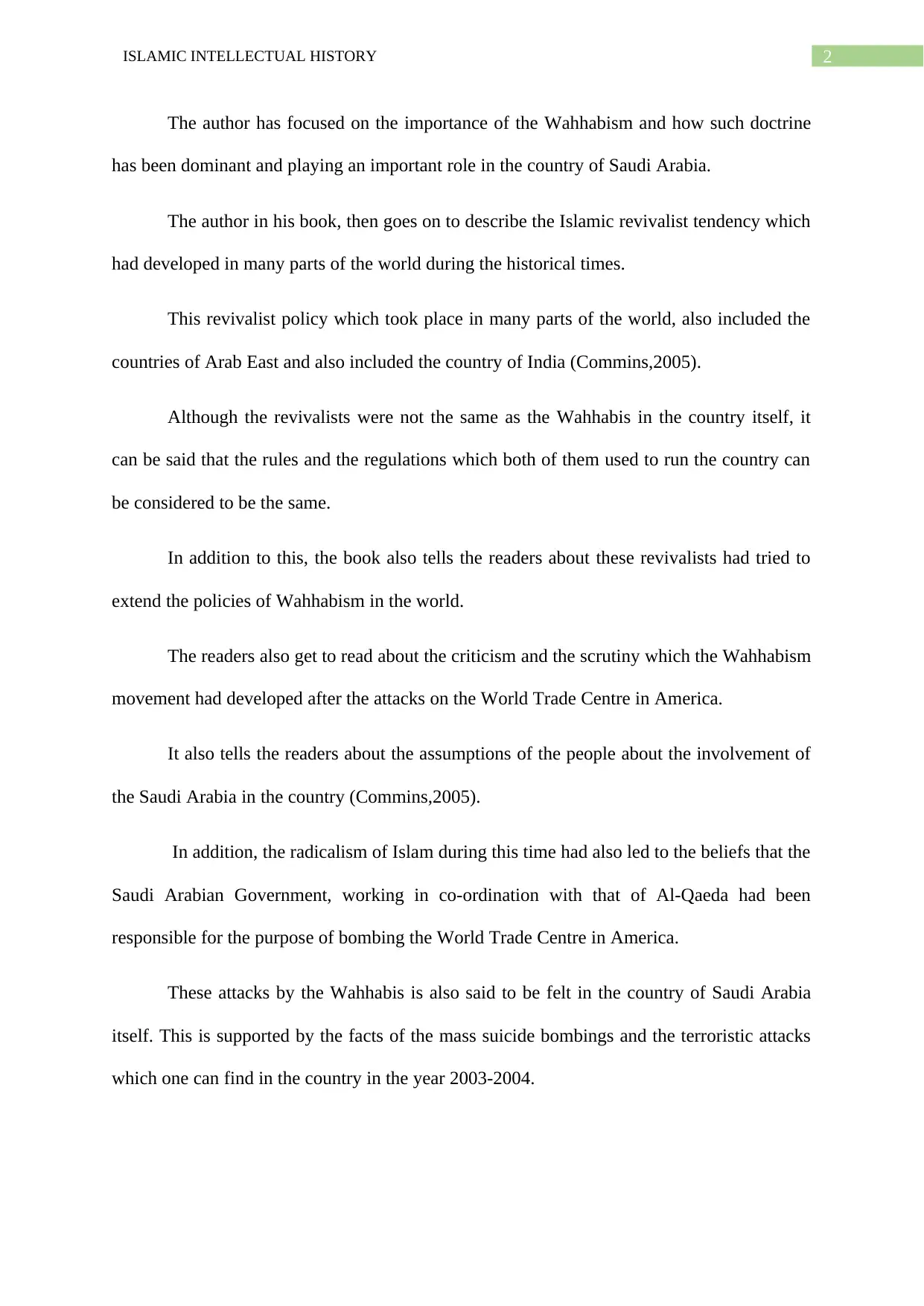
2ISLAMIC INTELLECTUAL HISTORY
The author has focused on the importance of the Wahhabism and how such doctrine
has been dominant and playing an important role in the country of Saudi Arabia.
The author in his book, then goes on to describe the Islamic revivalist tendency which
had developed in many parts of the world during the historical times.
This revivalist policy which took place in many parts of the world, also included the
countries of Arab East and also included the country of India (Commins,2005).
Although the revivalists were not the same as the Wahhabis in the country itself, it
can be said that the rules and the regulations which both of them used to run the country can
be considered to be the same.
In addition to this, the book also tells the readers about these revivalists had tried to
extend the policies of Wahhabism in the world.
The readers also get to read about the criticism and the scrutiny which the Wahhabism
movement had developed after the attacks on the World Trade Centre in America.
It also tells the readers about the assumptions of the people about the involvement of
the Saudi Arabia in the country (Commins,2005).
In addition, the radicalism of Islam during this time had also led to the beliefs that the
Saudi Arabian Government, working in co-ordination with that of Al-Qaeda had been
responsible for the purpose of bombing the World Trade Centre in America.
These attacks by the Wahhabis is also said to be felt in the country of Saudi Arabia
itself. This is supported by the facts of the mass suicide bombings and the terroristic attacks
which one can find in the country in the year 2003-2004.
The author has focused on the importance of the Wahhabism and how such doctrine
has been dominant and playing an important role in the country of Saudi Arabia.
The author in his book, then goes on to describe the Islamic revivalist tendency which
had developed in many parts of the world during the historical times.
This revivalist policy which took place in many parts of the world, also included the
countries of Arab East and also included the country of India (Commins,2005).
Although the revivalists were not the same as the Wahhabis in the country itself, it
can be said that the rules and the regulations which both of them used to run the country can
be considered to be the same.
In addition to this, the book also tells the readers about these revivalists had tried to
extend the policies of Wahhabism in the world.
The readers also get to read about the criticism and the scrutiny which the Wahhabism
movement had developed after the attacks on the World Trade Centre in America.
It also tells the readers about the assumptions of the people about the involvement of
the Saudi Arabia in the country (Commins,2005).
In addition, the radicalism of Islam during this time had also led to the beliefs that the
Saudi Arabian Government, working in co-ordination with that of Al-Qaeda had been
responsible for the purpose of bombing the World Trade Centre in America.
These attacks by the Wahhabis is also said to be felt in the country of Saudi Arabia
itself. This is supported by the facts of the mass suicide bombings and the terroristic attacks
which one can find in the country in the year 2003-2004.
⊘ This is a preview!⊘
Do you want full access?
Subscribe today to unlock all pages.

Trusted by 1+ million students worldwide
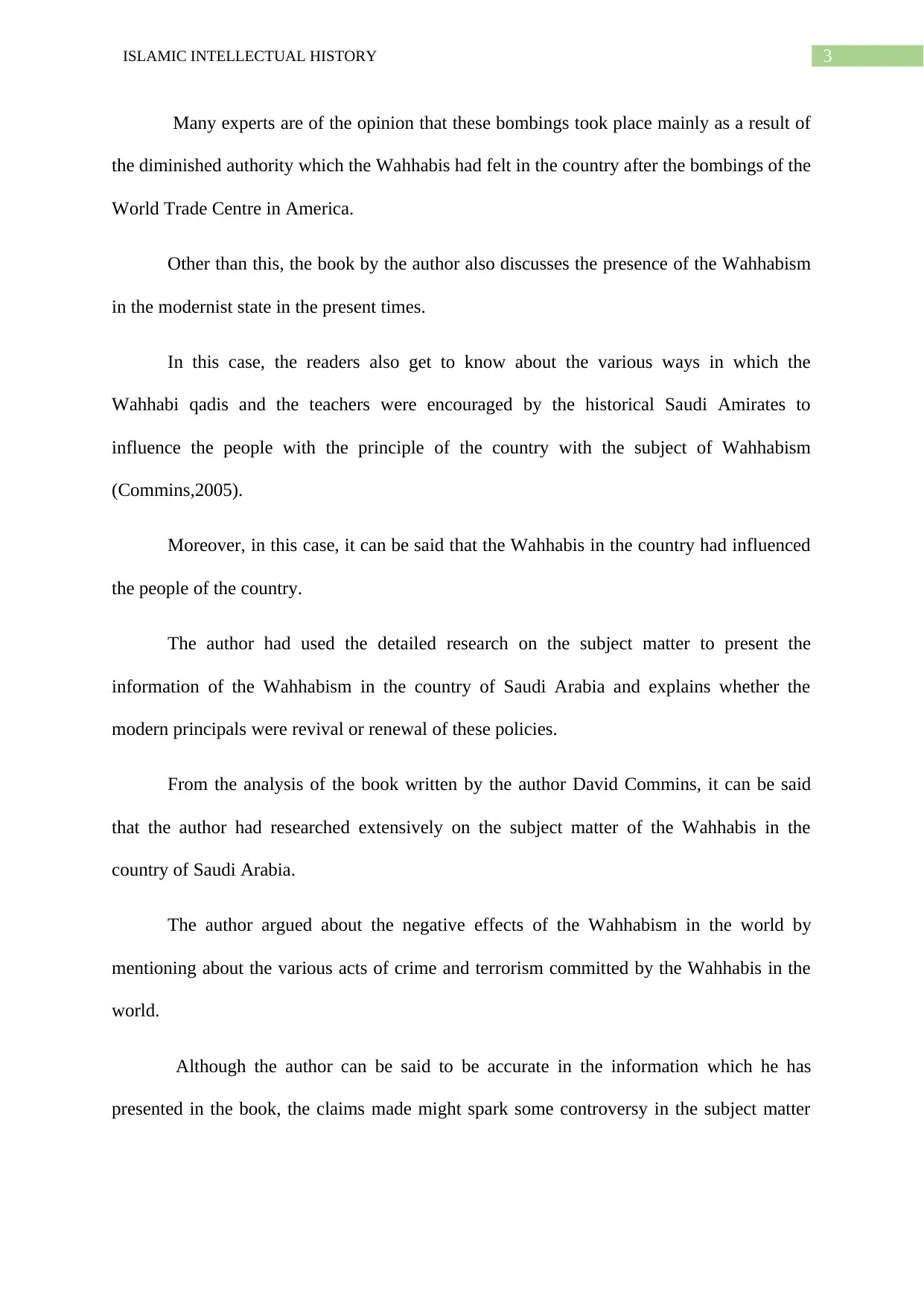
3ISLAMIC INTELLECTUAL HISTORY
Many experts are of the opinion that these bombings took place mainly as a result of
the diminished authority which the Wahhabis had felt in the country after the bombings of the
World Trade Centre in America.
Other than this, the book by the author also discusses the presence of the Wahhabism
in the modernist state in the present times.
In this case, the readers also get to know about the various ways in which the
Wahhabi qadis and the teachers were encouraged by the historical Saudi Amirates to
influence the people with the principle of the country with the subject of Wahhabism
(Commins,2005).
Moreover, in this case, it can be said that the Wahhabis in the country had influenced
the people of the country.
The author had used the detailed research on the subject matter to present the
information of the Wahhabism in the country of Saudi Arabia and explains whether the
modern principals were revival or renewal of these policies.
From the analysis of the book written by the author David Commins, it can be said
that the author had researched extensively on the subject matter of the Wahhabis in the
country of Saudi Arabia.
The author argued about the negative effects of the Wahhabism in the world by
mentioning about the various acts of crime and terrorism committed by the Wahhabis in the
world.
Although the author can be said to be accurate in the information which he has
presented in the book, the claims made might spark some controversy in the subject matter
Many experts are of the opinion that these bombings took place mainly as a result of
the diminished authority which the Wahhabis had felt in the country after the bombings of the
World Trade Centre in America.
Other than this, the book by the author also discusses the presence of the Wahhabism
in the modernist state in the present times.
In this case, the readers also get to know about the various ways in which the
Wahhabi qadis and the teachers were encouraged by the historical Saudi Amirates to
influence the people with the principle of the country with the subject of Wahhabism
(Commins,2005).
Moreover, in this case, it can be said that the Wahhabis in the country had influenced
the people of the country.
The author had used the detailed research on the subject matter to present the
information of the Wahhabism in the country of Saudi Arabia and explains whether the
modern principals were revival or renewal of these policies.
From the analysis of the book written by the author David Commins, it can be said
that the author had researched extensively on the subject matter of the Wahhabis in the
country of Saudi Arabia.
The author argued about the negative effects of the Wahhabism in the world by
mentioning about the various acts of crime and terrorism committed by the Wahhabis in the
world.
Although the author can be said to be accurate in the information which he has
presented in the book, the claims made might spark some controversy in the subject matter
Paraphrase This Document
Need a fresh take? Get an instant paraphrase of this document with our AI Paraphraser
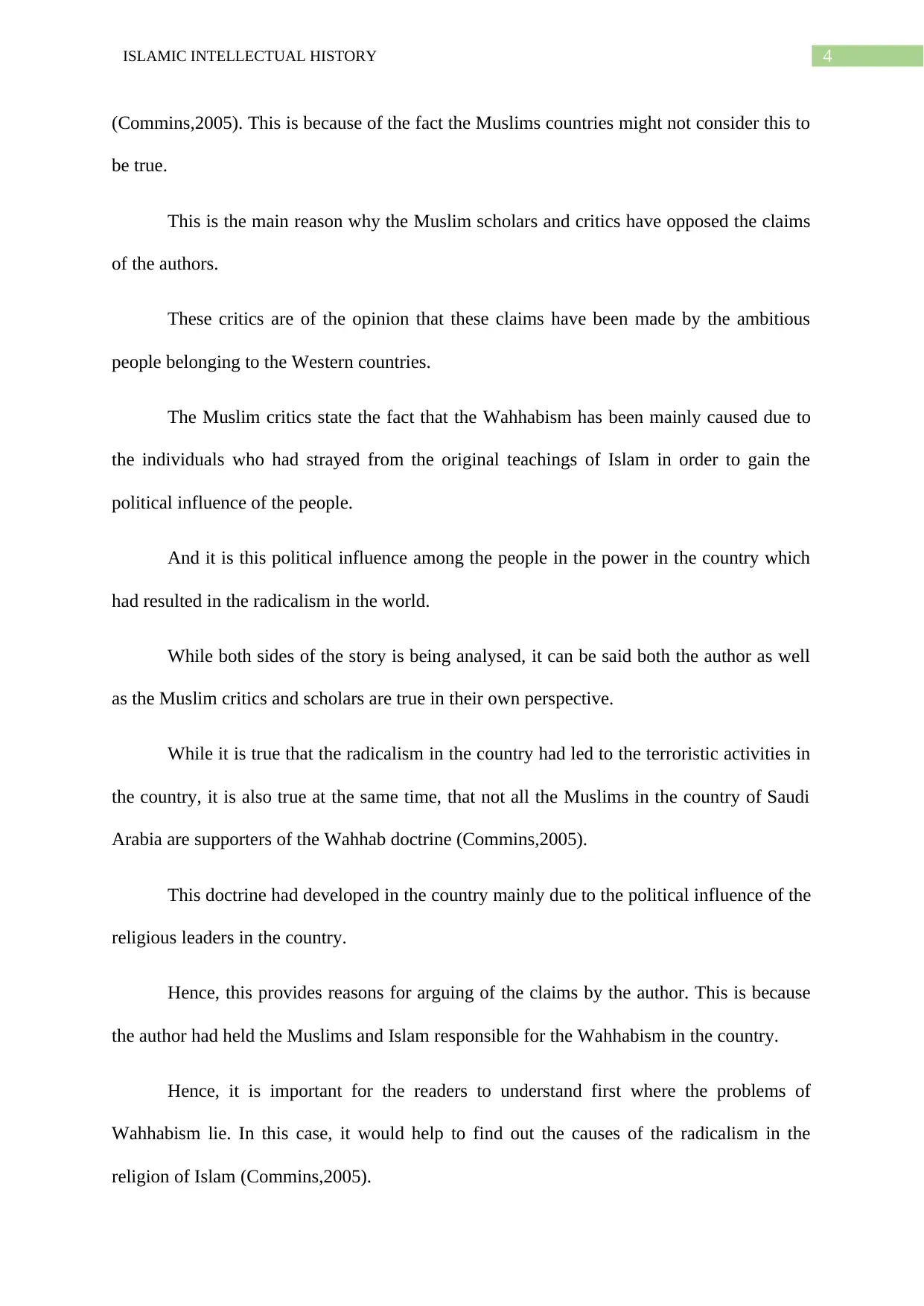
4ISLAMIC INTELLECTUAL HISTORY
(Commins,2005). This is because of the fact the Muslims countries might not consider this to
be true.
This is the main reason why the Muslim scholars and critics have opposed the claims
of the authors.
These critics are of the opinion that these claims have been made by the ambitious
people belonging to the Western countries.
The Muslim critics state the fact that the Wahhabism has been mainly caused due to
the individuals who had strayed from the original teachings of Islam in order to gain the
political influence of the people.
And it is this political influence among the people in the power in the country which
had resulted in the radicalism in the world.
While both sides of the story is being analysed, it can be said both the author as well
as the Muslim critics and scholars are true in their own perspective.
While it is true that the radicalism in the country had led to the terroristic activities in
the country, it is also true at the same time, that not all the Muslims in the country of Saudi
Arabia are supporters of the Wahhab doctrine (Commins,2005).
This doctrine had developed in the country mainly due to the political influence of the
religious leaders in the country.
Hence, this provides reasons for arguing of the claims by the author. This is because
the author had held the Muslims and Islam responsible for the Wahhabism in the country.
Hence, it is important for the readers to understand first where the problems of
Wahhabism lie. In this case, it would help to find out the causes of the radicalism in the
religion of Islam (Commins,2005).
(Commins,2005). This is because of the fact the Muslims countries might not consider this to
be true.
This is the main reason why the Muslim scholars and critics have opposed the claims
of the authors.
These critics are of the opinion that these claims have been made by the ambitious
people belonging to the Western countries.
The Muslim critics state the fact that the Wahhabism has been mainly caused due to
the individuals who had strayed from the original teachings of Islam in order to gain the
political influence of the people.
And it is this political influence among the people in the power in the country which
had resulted in the radicalism in the world.
While both sides of the story is being analysed, it can be said both the author as well
as the Muslim critics and scholars are true in their own perspective.
While it is true that the radicalism in the country had led to the terroristic activities in
the country, it is also true at the same time, that not all the Muslims in the country of Saudi
Arabia are supporters of the Wahhab doctrine (Commins,2005).
This doctrine had developed in the country mainly due to the political influence of the
religious leaders in the country.
Hence, this provides reasons for arguing of the claims by the author. This is because
the author had held the Muslims and Islam responsible for the Wahhabism in the country.
Hence, it is important for the readers to understand first where the problems of
Wahhabism lie. In this case, it would help to find out the causes of the radicalism in the
religion of Islam (Commins,2005).
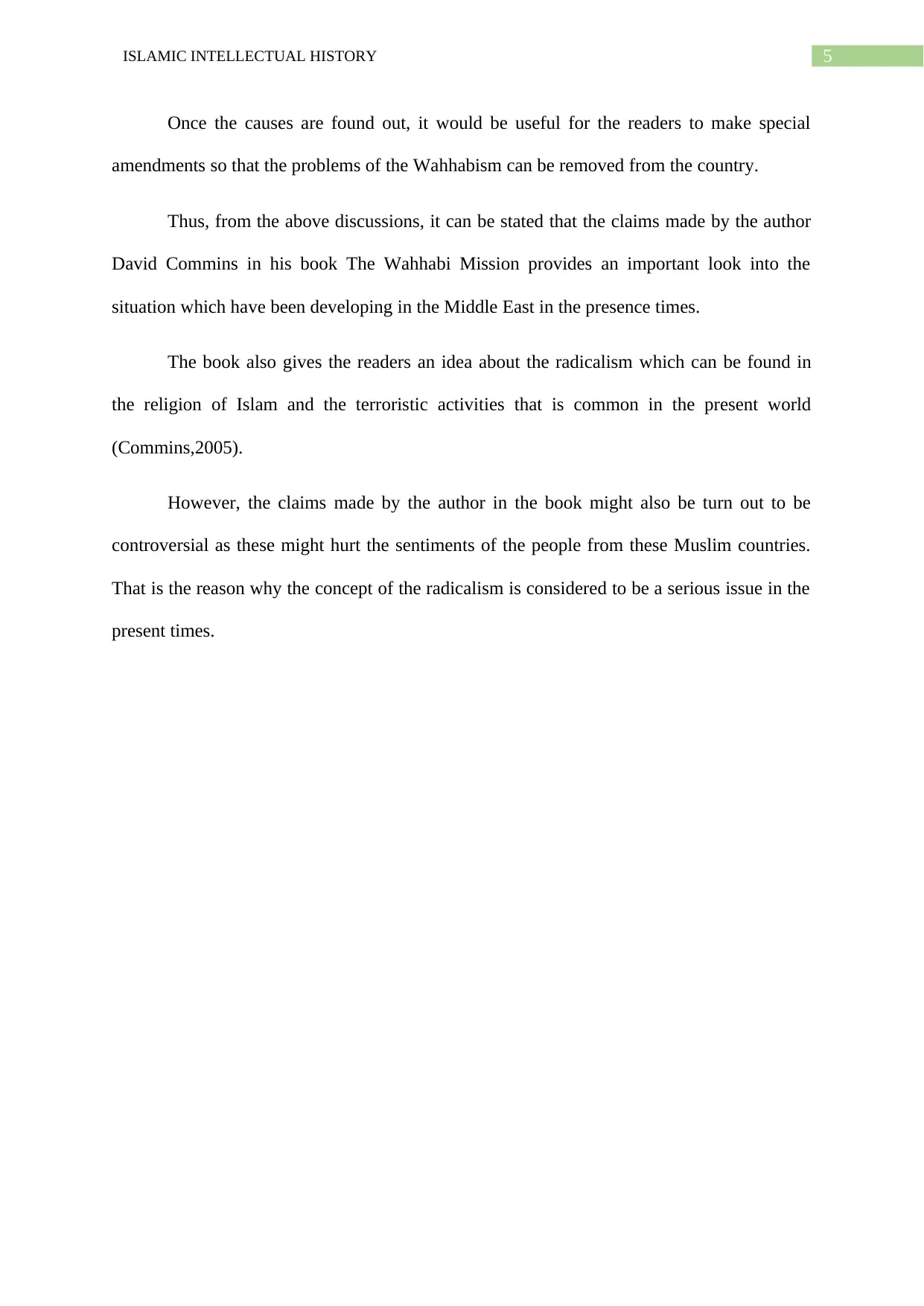
5ISLAMIC INTELLECTUAL HISTORY
Once the causes are found out, it would be useful for the readers to make special
amendments so that the problems of the Wahhabism can be removed from the country.
Thus, from the above discussions, it can be stated that the claims made by the author
David Commins in his book The Wahhabi Mission provides an important look into the
situation which have been developing in the Middle East in the presence times.
The book also gives the readers an idea about the radicalism which can be found in
the religion of Islam and the terroristic activities that is common in the present world
(Commins,2005).
However, the claims made by the author in the book might also be turn out to be
controversial as these might hurt the sentiments of the people from these Muslim countries.
That is the reason why the concept of the radicalism is considered to be a serious issue in the
present times.
Once the causes are found out, it would be useful for the readers to make special
amendments so that the problems of the Wahhabism can be removed from the country.
Thus, from the above discussions, it can be stated that the claims made by the author
David Commins in his book The Wahhabi Mission provides an important look into the
situation which have been developing in the Middle East in the presence times.
The book also gives the readers an idea about the radicalism which can be found in
the religion of Islam and the terroristic activities that is common in the present world
(Commins,2005).
However, the claims made by the author in the book might also be turn out to be
controversial as these might hurt the sentiments of the people from these Muslim countries.
That is the reason why the concept of the radicalism is considered to be a serious issue in the
present times.
⊘ This is a preview!⊘
Do you want full access?
Subscribe today to unlock all pages.

Trusted by 1+ million students worldwide
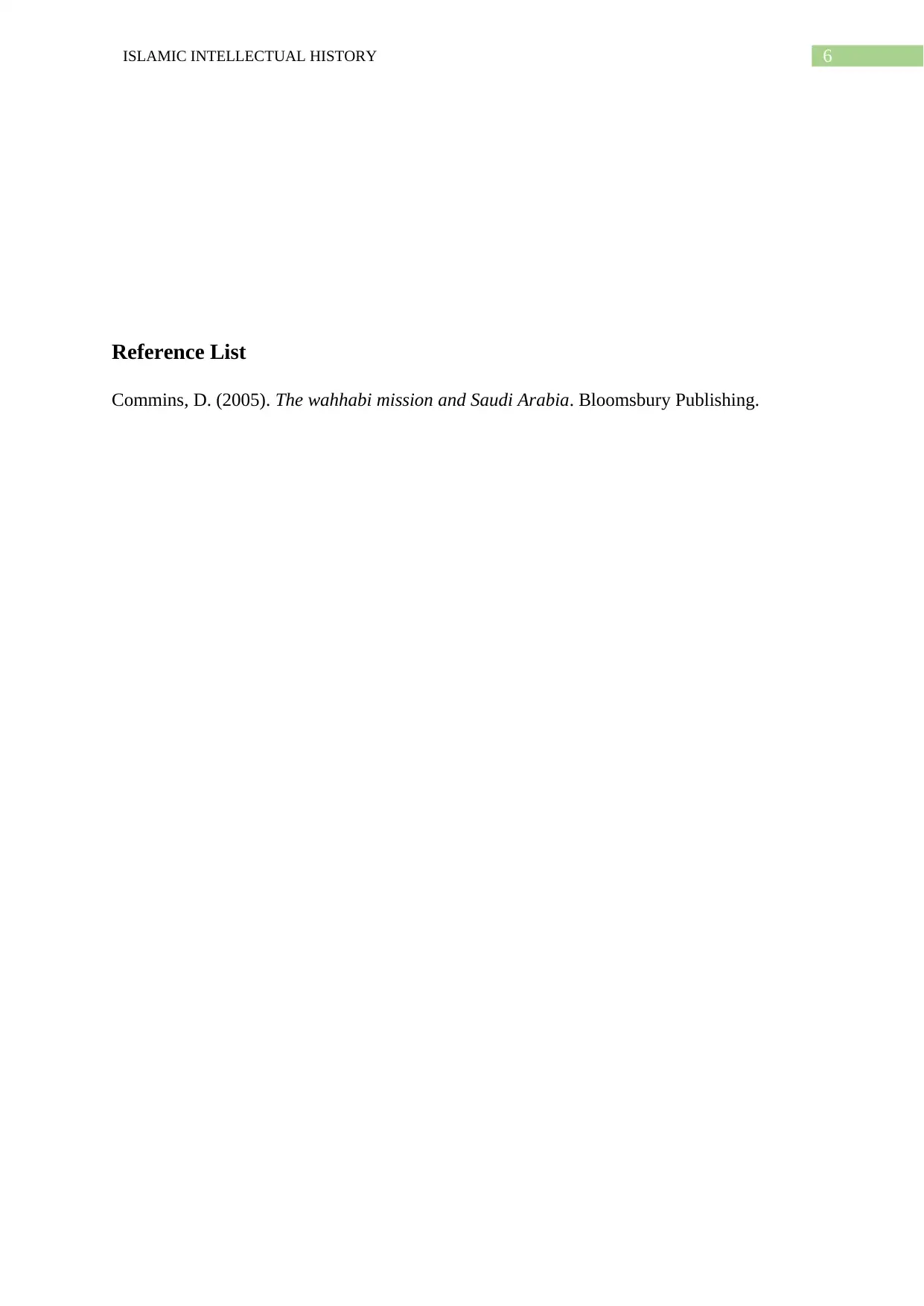
6ISLAMIC INTELLECTUAL HISTORY
Reference List
Commins, D. (2005). The wahhabi mission and Saudi Arabia. Bloomsbury Publishing.
Reference List
Commins, D. (2005). The wahhabi mission and Saudi Arabia. Bloomsbury Publishing.
1 out of 7
Your All-in-One AI-Powered Toolkit for Academic Success.
+13062052269
info@desklib.com
Available 24*7 on WhatsApp / Email
![[object Object]](/_next/static/media/star-bottom.7253800d.svg)
Unlock your academic potential
Copyright © 2020–2026 A2Z Services. All Rights Reserved. Developed and managed by ZUCOL.


